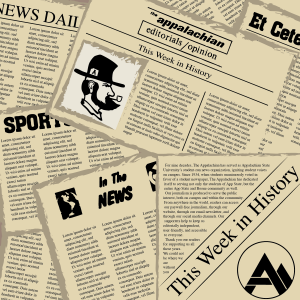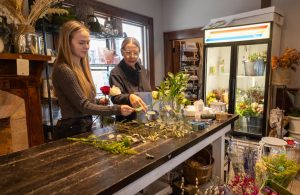Professors say it is too soon to understand environmental impact of social distancing in the High Country
April 7, 2020
Across the globe, the decrease in human activity due to COVID-19 has increased reports of positive environmental change like sea turtle hatches and less air pollution, but some App State professors said it may be too early to say how helpful social distancing will be for the High Country’s climate.
Geography and planning professor Mark Spond is the National Park Service liaison for the university. Spond said the pandemic is a shared personal responsibility, and people can help by “protect(ing) our environment on all levels right now.”
Spond said the environmental effects that have been reported need to be approached with multiple time frames. He said he thinks there could be “short-term improvements in some environmental entities,” but he’s concerned about potential long-term environmental damage.
“We’re dealing with a human tragedy here,” Spond said. “Unfortunately, so often human tragedies, as we start to look down the road, can have carryover effects to other species that we coexist with on this planet, and it could lead to overall environmental degradation.”
Spond said historically, when civil wars, disease outbreaks and large-scale death take place, they become the focal points of a population’s concern. These major events have led to a general decrease in wellbeing, which can expand to a major wildlife depopulation. A decrease in wildlife can in turn lead to more difficulties for humans who depend on those ecosystems to survive.
But, he said his biggest concerns for the High Country’s national parks are the potential for poaching, illegal waste dumping and major impacts to the trails and parks by overstressing the ecosystems and using them more than usual.
“These situations often result in lots of litter, high-impact recreation, and vandalism,” Spond wrote in an email. “But the current situation is potentially much worse because all these problems are amplified when people flock to outdoor areas because nothing else is open.”
Similar to when the government shuts down, the NPS suspended all volunteer-coordinated efforts and closed all facilities on the Blue Ridge Parkway, despite still allowing visitors and hikers.
Spond doesn’t discourage people from visiting the parks and getting outside during the quarantine, but he said it is important to remember “personal responsibility and ‘leave no trace’ ethics.”
“I think this is a time of learning for all of us,” Spond said.
Peter Soulé is a geography and planning professor who studies climate and vegetation change. He said direct impacts to North Carolina and the High Country may be temporary, but there are definitely some benefits.
“Less industry upstream (think the Tennessee Valley Authority) means we get less pollution heading into North Carolina. So, during COVID-19 we likely have better air quality,” Soulé wrote in an email. “Air pollution and health/mortality related to air pollution is a huge problem in certain areas (Beijing, New Delhi). So, temporary improvements in air quality are certainly a bonus.”
James Sherman, a professor in the department of physics and aeronautics, has atmospheric monitoring sites in the High Country, which are part of NASA and National Oceanic and Atmospheric Administration’s networks.
Sherman said aerosol concentrations have decreased in the 10 years he has monitored them. These aerosols cause a haze, which is where the name “Blue Ridge” comes from.
“This haze is good at reflecting sunlight back into space that otherwise would have warmed to the earth and the atmosphere,” Sherman said.
He said it is too early to tell if the decrease in human activity will reduce the amount of aerosol loading, but it will be important to compare these months to past years and future years.
“NOAA is very interested in their sites continuing to make measurements during these periods, which is why it’s so critical for App to keep our measurements going on during this time,” Sherman said. “They want to study how the effects of this are on pollution and on climate.”
Sherman said one thing everyone can do during and after COVID-19 is vote.
“We can vote for politicians who will stress climate change,” Sherman said.
Both Sherman and Spond pointed out that this moment in time cannot reverse decades of damage, but there are small steps that can be taken right now and in the future.
“What we’re doing right now by trying to mitigate the spread, well then maybe making decisions that are more environmentally friendly outside of this context might come a little more easily as well,” Spond said.











